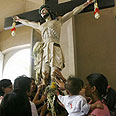
Scholars issue report on Oberammergau Passion Play
Initiated by ADL, Christian and Jewish scholars compose report suggesting new Passion Play script depicting Jesus' last days. Controversial play accused of contributing to 'hostility towards Jews'
A first-ever major study of the Oberammergau Passion Play by leading scholars on Christian-Jewish relations, released Friday, details the positive and negative aspects on how it portrays Jews, Judaism and Jesus.
The 16-page report examines the 2010 script of the world’s oldest passion play which was last performed in 2000 in Germany. The new production, depicting the last days of Jesus, officially premieres on May 15.
In a section on recommendations, the scholars suggest play officials compose a totally new script using contemporary biblical studies and historical research in order to eliminate continuing damaging negative stereotypes of Jews and Judaism.
The study was initiated by the Anti-Defamation League (ADL) and the Council of Centers on Jewish Christian Relations (CCJR), the nation’s leading association of academic and educational centers and institutes devoted to enhancing mutual understanding between Jews and Christians. Nine scholars and interfaith experts participated in the study.
The report is supported by the American Jewish Committee, B’nai B’rith International and the National Council of Synagogues.
The scholars report is based on a study of the 2010 script in German and English. The report stressed that it does not consider issues of staging, music, casting, costuming and other theatrical factors which can “significantly” affect the presentation of the story.
The full report can be accessed here: www.ccjr.us/news/813-ccjr2010may14
The scholars explained that Passion Plays, which for centuries have expressed popular devotion to Jesus, “have also typically depicted the Jewish people as unfaithful to God and as ‘Christ killers,’ a depiction that has contributed to hostility, sometimes violent hostility, towards Jews.”
They noted that in the wake of the Holocaust, various Christian churches and international church bodies such as the International Council of Christians and Jews, issued statements calling for greater care in how the passion was presented.
“This report provides interested persons with information about passion plays in general and the 2010 Oberammergau Passion Play in particular.”
The scholars examined the 2010 Oberammergau Passion Play to see how it complied with contemporary historical and biblical research and relevant church teaching documents about how to present passion plays.
In general, the scholars “recognized and appreciated the efforts the scriptwriters had made, even if not always successful, to avoid the potential for anti-Judaism in the Passion Play.”
However they conclude that “Jewish opponents of Jesus are unjustifiably depicted in such extreme terms as to risk impressing on the audience a negative image of the entire Jewish community.”
The scholars' report details the positive changes made in the play as well as the continuing problems which serve to portray negative stereotypes of Jews and Judaism. The report also offers recommendations and specific suggestions to eliminate potential anti-Judaism from future productions.
Examples of “positive impressions” include:
- Jesus is clearly shown to be a Jew; the figure of Judas credibly displays complex motivations; and the script incorporates much of Jesus’ teaching.
“Negative Impressions” include:
- The play’s use of Old Testament images; an inaccurate portrayal of the Temple priesthood; and the fanatical depiction of the Jewish High Priest Caiaphas.
The scholars offered 16 recommendations, encouraging the scriptwriters to continue their work of reform. “It is possible that some of our concerns result from the script’s lingering dependence on” earlier Oberammergau scripts. “If so, they could be significantly addressed were a totally new script informed by contemporary biblical studies and historical research to be composed.”
The report also recommends that the German Conference of Catholic Bishops consider adopting documents on how to present passion plays similar to those composed by the US Bishops’ Committee on Ecumenical and Interreligious Affairs’ 1988, Criteria for the Evaluation of Dramatizations of the Passion.










